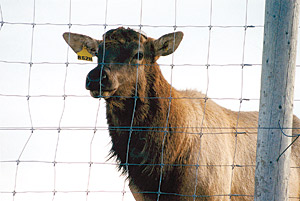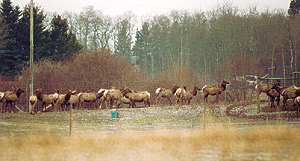There is a crisis in conservation. It is not being recognized for what it is by a good many who have the most to lose, the wildlife profession included. The crisis resides in the current dismantling of policies and laws that have nurtured, protected, and restored wildlife continent-wide during the last 70 years. Who shall own and benefit from wildlife has been a central question to the long struggle. At work are historic forces that, should we allow them to go unchecked, will once again see wildlife a hostage of private ownership, as it has been all to frequently in the past. Policies that legalize trafficking in dead wildlife and paid hunting are diametrically opposed to the policies proven successful in wildlife conservation in North America.
– Valerius Geist
Wildlife Conservation Policy
 |
| The domestication of wild animals has brought us many diseases including tuberculosis, small pox, influenza and SARS. |
Dr. Valerius Geist, Professor Emeritus, University of Calgary first wrote that passage, I assume, some time in the early to mid-nineties just prior to the publishing of his book Wildlife Conservation Policy (ISBN 1-55059-114-2). At that time this magazine didn’t exist and I had little knowledge of the game farming industry. In fact, it wasn’t until about 5 years later when I first met Darrel Rowledge of the Alliance For Public Wildlife that I fully began to comprehend the dangers associated with the farming of wildlife. But back then, before I had met Rowledge and even prior to that, I have to assume I wasn’t the only one who held little more than a passing interest in government created policy that allowed—legalized—the commercialization of our public wildlife. Had more of us known of the repercussions of such an industry I’m sure we would have fought tooth and nail to keep the high fences out of our province—I know I would have. But, alas, as happens far too often, we seem to make the most noise after it is far too late.
But for people like Darrel Rowledge and Valerius Geist, this has been a battle that has been going on for a long, long time. And it is a battle that, according to Rowledge, has to continue on or the end result will be catastrophic where Alberta and Canada’s wildlife is concerned. With CWD running rampant in Saskatchewan and on the verge of plaguing Alberta’s wildlife to the same end, the concern is very real.
“If we don’t get rid of the source of the disease (game farms)we will never get rid of the disease. We will never contain or control it. It will become endemic in our whitetail and mule deer populations, which means there is no way you will ever stop it,” cringed Rowledge.
And he is correct in what he says.
In a letter dated January 9, 2006, addressed to then Prime Minister Paul Martin, signed by Rowledge, Geist and Jim Fulton of the David Suzuki Foundation, it was clearly pointed out that all of the “predicted” outcomes of allowing the commercialization of wildlife have come true.
“As predicted, the ‘industry’ is virtually bankrupt. Game farmers, have realized that the venture will never be economically viable. Entire herds have been destroyed, or in some cases, simply turned lose,” screamed the letter, and “As predicted, disease problems persist—the spread of CWD to public wildlife has now been repeatedly confirmed in Alberta as well as Saskatchewan. Experts warn that there are no known barriers to stop it.”
 |
| The commercialization of wildlife goes against everything conservation stands for. |
Considering these same “expert” predictions have all come true, this last warning should be taken seriously by those in control, namely our governments and their agricultural departments. But is anybody listening? According to Rowledge, “To the best of my knowledge, no! Canada's National CWD Control Strategy doesn’t even recognize the problem. There isn’t a single word about game farming in the entire document.”
And considering The Expert Scientific Panel on Chronic Wasting Disease confirmed that the source of Canada’s CWD was “spillover from infected game farms” it seems ludicrous this industry be allowed to continue to operate—with the use of public funds—in this country.
“Governments are subsidizing a proven threat to public wildlife/economies, traditional agriculture, and public health,” pointed out the letter. And as stated on page 19 of Canada’s National CWD Control Strategy, “A study in 1996 demonstrated that activity based on wildlife contributed $12.1 billion to the Canadian GDP in that year, equivalent to the $12.3 billion that was the total contribution to the GDP by all of agriculture.”
If that statement alone isn’t enough to make our governments stand up and take notice, I’m not sure what is. Let’s face it, this is a crisis, and indeed it’s a big one.
“I just wish they would take it seriously for what it is,” sighed Rowledge.
And what it is is a disease capable of destroying our wild cervid herds with the potential to cause serious human health problems. Considering that the domestication of wild animals has been responsible for diseases such as tuberculosis, small pox and influenza, as well as most recently SARS, which came from Asian game farms raising civet cats for consumption, allowing the continuation and subsidizing of game farms with public money is absurd at best.
Tests have shown that there is a slight chance that CWD could be transmitted to humans. There are hunter warnings regarding which parts of harvested deer to avoid eating. Manitoba has banned the use of game farmed products like lures and scents because of the chance of it helping in the spread of CWD. Yet game farms still exist.
This is not the game farmers fault, rather, the blame lies directly on the shoulders of governments who allowed the industry to start up without proper assessment.
“They were lured into this by governments who lied to them,” said Rowledge, referring to what has ended up being little more than a government encouraged pyramid scheme that made those who got in first a ton of money while leaving those less fortunate holding the poison bag.
It is time for our governments to take action, and it has to start behind the high fences. If not, the end result could be something of unimaginable proportions.
This is indeed, a crisis. ■
For previous Outdoor Pursuits click here.
|


